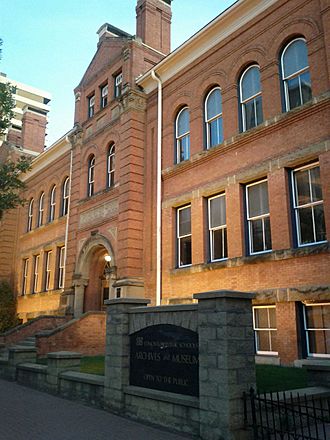McKay Avenue School facts for kids
Quick facts for kids McKay Avenue School |
|
|---|---|

McKay Avenue School in 2012
|
|
| Alternative names | Edmonton School |
| General information | |
| Status | Complete |
| Type | Museum |
| Architectural style | Richardsonian Romanesque |
| Address | 10425 99th Avenue NW, Edmonton, Alberta, Canada |
| Coordinates | 53°32′12.77″N 113°30′00.53″W / 53.5368806°N 113.5001472°W |
| Named for | Dr. William MacKay |
| Construction started | 1904 |
| Completed | 1905 |
| Client | Edmonton Public Schools |
| Design and construction | |
| Architect | Henry Denny Johnson |
| Official name: McKay Avenue School | |
| Designated: | 18 May 1976 |
McKay Avenue School is a special old building in Edmonton, Alberta, Canada. It used to be a school, but now it's a historic site. This means it's an important place from the past. Today, it's home to the Edmonton Public School Board's archives and museum. Here, you can learn about the history of schools in Edmonton and even some early Alberta politics!
Contents
History of the School Building
The First Schoolhouse
The very first school building on this spot was a small, one-room schoolhouse. It was called Edmonton School. It was built in 1881 on land given by the Hudson's Bay Company. People like Matthew McCauley helped raise money for it. This wooden building had a porch, double doors, and eight large windows.
Building the New School
As Edmonton grew, more students needed a bigger school. So, a new, much larger school was planned. Architect Henry Denny Johnson designed the new building. He used a style called Richardsonian Romanesque, which often features strong, rounded arches.
Construction began in 1904. The Governor General, Lord Minto, helped by laying the first stone, called the cornerstone. The school was finished and opened on September 1, 1905. This was the same day Alberta officially became a province in Canada.
A Place for Government
The McKay Avenue School was very important in Alberta's early days. The main government building, the Alberta Legislature Building, wasn't ready yet. So, the first two meetings of Alberta's government happened right inside the McKay Avenue School! This was in 1906 and 1907.
During these meetings, important decisions were made. They decided Edmonton would be the capital city. They also created the University of Alberta and set up the province's courts. The school was named after Dr. William MacKay, a doctor for the Hudson's Bay Company. Even though his name was "MacKay," the school's name is spelled "McKay."
School Closure
Over many years, fewer students lived in the downtown Edmonton area. By 1983, only 59 students were attending McKay Avenue School. Because of the low number of students, the school closed its doors on June 30, 1983.
Edmonton Public Schools Archives and Museum
Today, the McKay Avenue School is home to the Edmonton Public Schools Archives and Museum. This is a special place where you can learn about the history of schools in Edmonton.
What You Can Find There
The museum keeps old records and items related to the Edmonton Public Schools. It's a place where people can do research. The museum also offers fun, hands-on learning programs for students. You can see a schoolroom set up like it was in the 1950s. There's also the old legislative assembly room, restored to look like it did in 1906.
Between 2019 and 2020, the museum hosted a special exhibit. It was a traveling display from the Anne Frank House, which tells the story of Anne Frank.
Repairs and Reopening
In February 2013, the McKay School had a flood. This caused a lot of damage to the building. It needed a lot of money, about $2.4 million, for repairs. Many groups helped raise the money, including the Edmonton Public School Board and the governments of Alberta and Canada. Thanks to their efforts, the building was repaired by 2016. It reopened to the public in October 2018.
The Original Schoolhouse
Next to the McKay Avenue School, you can also see the original one-room schoolhouse from the 1880s. This is the building the larger McKay Avenue School replaced in 1905. Today, this old schoolhouse is used for museum education programs.
Notable Alumni
Many interesting people went to McKay Avenue School. Here are a few:
- Lotta C. Dempsey - A Canadian journalist, writer, and TV personality.
- Wop May - A famous Canadian pilot and a hero from World War I.
- Ronald Martland - A Canadian lawyer and judge who served on the highest court in Canada.
- Leslie Nielsen - A well-known Canadian actor and comedian.

